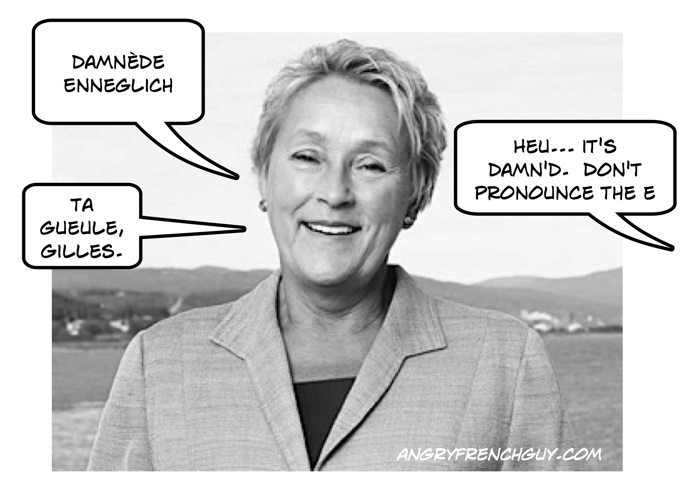Pauline Marois’ Quiet English Revolution

In 1988, just before South Africa’s Apartheid regime was about to expire its last foul breath, an antiapartheid organization called the South African Council for Higher Education put out a small comic book designed to help young black children to learn English. The book was immediately banned by the all-white ruling minority.
Were blacks forbidden to learn English under Apartheid? Quite the contrary. English and Afrikaans, the languages of the white minority, were the sole official languages of South Africa in those days while the languages spoken by the black majority had no legal status. English and Afrikaans were the languages of government, public services and of secondary education, even for blacks.
The novel on which the comic book was based, Down Second Avenue by the exiled South African writer Ezekial Mphahlele, had been freely available in South Africa for three decades. Even the comic book version of the author’s account of his youth in violent and racist Pretoria had been published before.
Why was the government scared of this edition? Because it was a textbook. Because it was a tool designed to get young black kids to reflect on injustice and racism, in their master’s language…
Young blacks were taught English during Apartheid, but they were taught using textbooks from England about white preppy boys in London. Books that perpetuated the image of English as the language of power, and the corollary, that power rightfully belonged to the English. Their reality: black, multilingual and poor was foreign. Defective.
Down Second Avenue: The comic turned that on its head. It taught Blacks the language of power so they could use it to discuss their reality and to empower themselves. They could even use English, as other textbooks eventually did, to teach you black kids about the multilingual reality of Africa and the importance of protecting and empowering African languages.
This is where Pauline Marois comes in.
Ignoring the extremely violent opposition from a certain wing of the Parti Québécois and the even more hysterical cries of madness from the Federalist A-list – who seem to share a belief that almighty English will destroy Québec and must at all costs be kept out of the hands of common people – this week Pauline Marois once again proposed that certain classes in Québec high schools, perhaps history, geography or even math, be taught in English.
This is (almost) a brilliant idea.
Parents have been demanding better English classes and immersion and this is a very positive step, especially for families in the regions who don’t have as much exposure to English as Montrealers.
But Pauline Marois’ truly revolutionary idea, which is also the most controversial, is her twice repeated suggestion that History, be thought in English. Her not-so-great idea is to teach math in English.
Why is it a good idea to teach History in the international language of science and not math? Precisely because we would spontaneously have it the other way around.
Currently, History is taught in French. French becomes the language of the past, of our heritage, of the Plains of Abraham defeat and the failed referendums. English on the other hand is taught as a second language necessary for travel, technology, modernity and international fraternity (as it is always naively portrayed in US and Western-made textbooks).
With Marois’ proposal, English would become the language used to explore the past of French-Canadians, but also their successes, the Quiet Revolution and the ongoing struggle to protect French-language culture in North America. Geography class would become a place to discuss, in English, the linguistic and cultural diversity of planet Earth and the international vitality of the Francophonie, a language that as never had more speakers than it has today.
All this without threatening the overall predominance of the language of Joseph-Armand Bombardier in all other subjects, including the all important sciences.
Teaching History in English would significantly improve the access of Québec kids to English without making them captive of the stereotype that reduces French to the status of heritage language while making English the only language of the modern world outside.
The South African comic book simultaneously helped blacks learn the language of power, but also exposed how that language was a tool of their oppression. In the same way, teaching History and geography in English would give Québec kids access to the international language of business and scholarship, but also some perspective on where Québec belongs in this global multilingual world.
Enough perspective to ask questions like:
If English really is the magic amulet that automatically opens the doors of modernity, technology and wealth, then why aren’t the Philippines the richest country in Asia? And why isn’t Japan the poorest?
Discuss. In English.